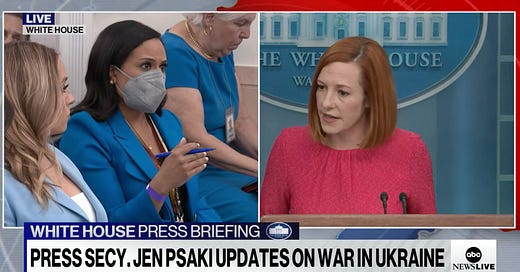The Media Is Begging for Biden to Smash the Big Button Labeled 'More War'
You can always count on the White House press corps.
Whenever an armed conflict breaks out, you can count on one thing: American reporters asking why the big button labeled “more war” isn’t being smashed as hard as it can. So it’s proven with the war in Ukraine, as U.S. journalists have begun visibly chafing at the Biden administration’s refusal to countenance a no-fly zone in the country, or to send fighter planes to Ukraine.
Biden, in a display of unusual rationality, has pointed out that maintaining a no-fly zone, or sending fighter jets, could easily tip the U.S. and NATO into direct military battles with Russia, which would mean that we had all essentially slipped into World War III. This position has held firmly, but, as the war grinds on, the armchair critics are getting antsy.
Yes, we’ve reached the point where “is preserving all of human life more important than defeating Vladimir Putin?” is a talking point. And it’s not just weird tech dudes begging us to have a rethink. Former U.S. ambassador to Russia Michael McFaul, last seen making some…questionable comments about Hitler, scoffed on Wednesday at the notion that World War III would ever happen.

Five minutes later, McFaul tweeted out an article that labeled Putin “the world’s most dangerous man.” Make those two things add up!
This hunger for America to ratchet up its involvement in Ukraine—I guess brutal sanctions on the Russian economy and billions of dollars in military aid don’t cut it—has, over the past couple of days, found a predictably welcome host in the White House press corps, which has never seen a military intervention it doesn’t like, no matter how many of them go horribly wrong. On Tuesday, The Intercept cataloged a string of White House journalists asking White House Press Secretary Jen Psaki why Biden didn’t want to send fighter planes to Ukraine, and whether he was showing enough “strength” against Vladimir Putin. On Wednesday, Ukrainian President Volodymyr Zelensky’s dramatic address to Congress—in which he used a harrowing video of Ukrainians under siege to bolster his plea for a no-fly zone—and Biden’s unveiling of a new shipment of military equipment to Ukraine gave the press corps another bite at the apple.
One after another, journalists asked Psaki—someone for whom I have never had even a vaguely charitable word until this moment—whether, now that Zelensky had spoken, Biden had reconsidered any of his red lines. She was asked why the U.S. wasn’t using “every tool” it had to beat Putin back, and what difference it saw between sending anti-aircraft weaponry and fighter jets. (Because one is used defensively and one is used offensively, she replied.) She was asked repeatedly about the aforementioned MiG jets that the press corps appears desperate to send to Ukraine. At one point, she told NBC’s Kristen Welker that she had answered this question “approximately 167 times.” “Here’s 168,” Welker said.

Welker also asked, “Is President Biden satisfied that he’s meeting this leadership moment given that we’re now three weeks into this war?”
American journalists and pundits are fond of using this kind of moralistic and high-flung language in wartime, but when they do, they betray above all else the blitheness with which this country approaches such matters. Not even our humiliation and defeat in Iraq and Afghanistan has been able to cure the U.S. establishment of its certainty that American force is easy, constantly necessary, and consequence-free. Not even a potential standoff with a nuclear-armed power headed by a malevolent thug with his back against the wall will dislodge this fantasy.
It’s not that the underlying premise of the questions—we’re already very involved in the war, so why are you making these kinds of distinctions?—is wrong, exactly. The U.S. and NATO are indeed waging a de facto proxy war with Russia in Ukraine. The issue is that the solutions offered only ever go in one direction—more war, more bloodshed, more escalation. What is needed the most right now is a negotiated peace between Russia and Ukraine, not for the war to spread throughout Europe. The difference between where things are now and where they would be if we actually stepped across the border and started fighting directly with Russia should be obvious. Clearly, what Welker described as “meeting this leadership moment” would entail escalating the situation in Ukraine to wild new levels. Apparently, that’s exactly what some of our most high-profile journalists want.








So I'm going to say this not to start a fight, and not because I think we should go headlong into a war that could cause more bloodshed. I long for peace, especially since I was born on the Romanian - Ukrainian border and have family in both countries.
At what point would this kind of thinking have advocated for going to war in WW1 AND WW2? What makes what's happening here different than what happened in the 30s? How do we know that not doing something now, not standing up to Putin in a more solid way, won't cause the war to spread further, even to NATO?
I know they're not the same thing (no two wars are), but millions have been displaced and there is a war criminal invading Eastern Europe and killing civilians indiscriminately.
I had a conversation with some friends who were mad that the jets weren’t sent to Ukraine (as well as about the No Fly Zone) and I told them (and I never thought I’d ever say this) but NATO was smart not to do it.
There’s no much bullshit the media is throwing and I hate that it’s making most of my friends who are normally level headed (hell, most definitely smarter than me in many areas) suddenly say this irrational shit.
Good thing I’m taking a four day weekend. I’m gonna need it!